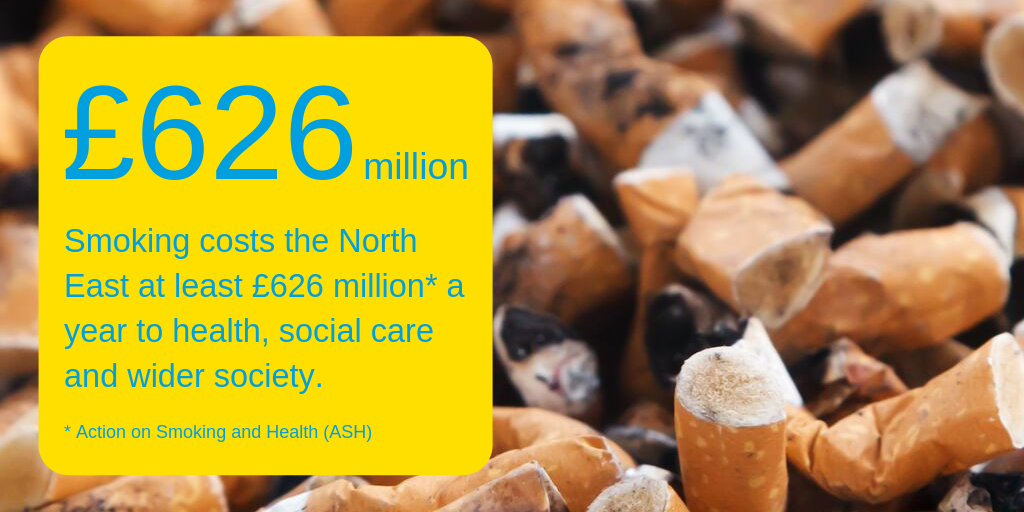Cost of smoking to the North East

CALLS have been made for tobacco companies to pay more towards the damage they cause as new figures show smoking costs vital services in the North East at least £626m a year.
The data according to calculations carried out for Action on Smoking and Health (ASH) show the high costs of smoking to services across the North East each year:
- There are 339,716 smokers in the North East
- Smoking causes 5,300 early deaths each year in the region
In 2018 this resulted in:
- a £132 million cost for the North East NHS– including 1.2 million GP consultations, over 36,000 hospital admissions, 223,000 outpatient visits and over 411,000 practice nurse consultations for smoking-related conditions.
- A £50 million cost in social care for current and former smokers -over £41m of that from local authority social care budgets and over £9m paid by individuals or families. The average age at which smokers develop a social care need for the first time is 62, compared to 72 for never-smokers.
- Over £430 million lost from the regional economy in the North East as a result of lost productivity due to smoking; including £58m in absenteeism
- Around £12 million in house fires causing fatalities, non-fatal injuries and property damage
The online tool from Action on Smoking and Health breaks down the real costs of smoking by region, local authority and ward, and also shows:
• Smokers in the North East also spend around £456 million a year on tobacco each year, with tobacco also a driver of personal poverty.
• The tobacco duty collected is £365.4 million but despite this tobacco still costs the community in the North East one and half times as much as the duty raised
• Smokers in the North East consume about 2.8 million cigarettes every day resulting in around 149 tonnes of waste annually and around 63 tonnes discarded as street litter – enough butts discarded to fill 2699 wheelie bins.
Smoking still kills around 78,000 people a year in England, it remains the leading cause of preventable premature death and is responsible for half the difference in life expectancy between rich and poor. In 2015 the top six global tobacco manufacturers earned more profits than Coca Cola, Walt Disney, Fed Ex, Google, McDonalds and Starbucks combined.
Ailsa Rutter OBE, director of Fresh, said: “As well as the harm to health, these figures show the damage tobacco smoking does to our local communities, costing every local authority, every family, every GP surgery, every business and every hospital. It is also a major driver of poverty.
“Most smokers get addicted to smoking in childhood and we support efforts to help people to stop smoking.
“The NHS can do more to treat tobacco dependency and ideally prevent some of these illnesses, but it is outrageous these costs are being borne by our local authorities and NHS at a time when budgets are more stretched than ever.
“We urgently need a ‘polluter pays’ charge on the tobacco companies to fund effective measures to reduce smoking across all our communities. The tobacco industry does the damage, it should be made to pay for the harm it cause”.
Action on Smoking and Health Chief Executive Deborah Arnott said: “”Smoking takes a heavy toll on communities, local services and society at large. Disease and disability from smoking harms current smokers, ex-smokers and those exposed to secondhand smoke, often young children and those yet to be born.
“If the Government succeeds in ending smoking in England by 2030, this can be stopped. But to achieve such an ambitious goal needs funding. The tobacco industry does the damage, the Government must make it pay to put things right.
It is estimated that tobacco companies in the UK make a collective annual profit of around £1.5 billion [2]. ASH and Fresh are calling for the Government to place a charge on the tobacco industry with the collected funding put towards efforts to reduce smoking prevalence.
Smoking is an addiction of childhood, not an adult choice, with two thirds of adult smokers starting before they reach 18 and only one in three likely to quit by the age of 60.[3]
